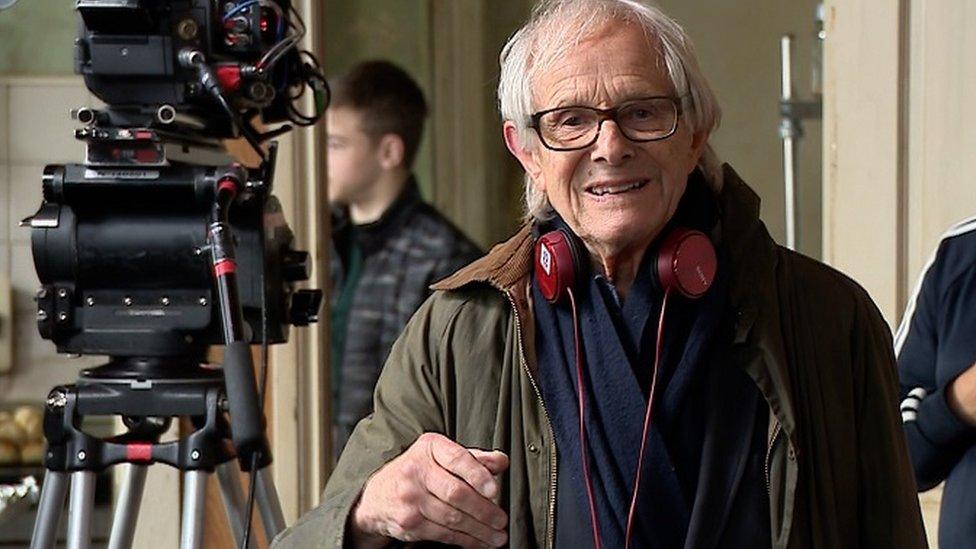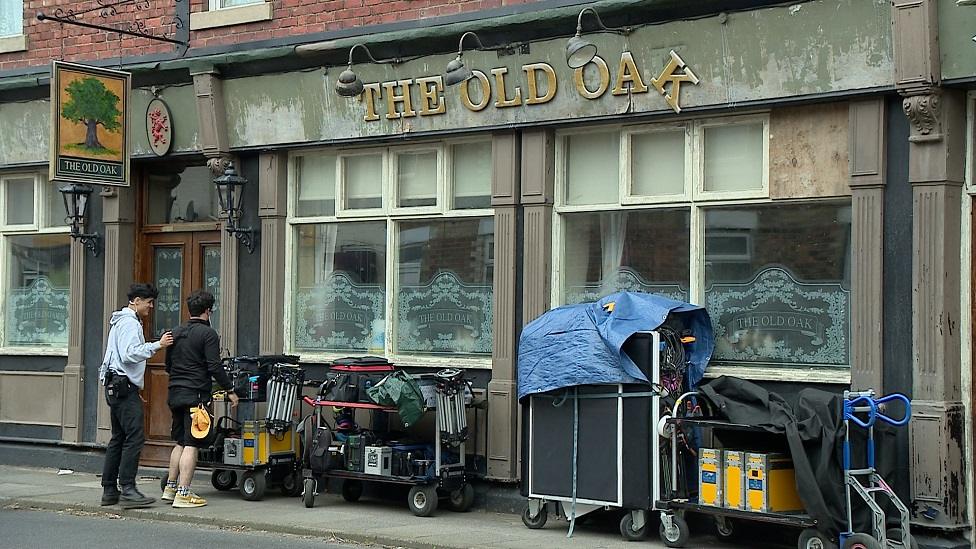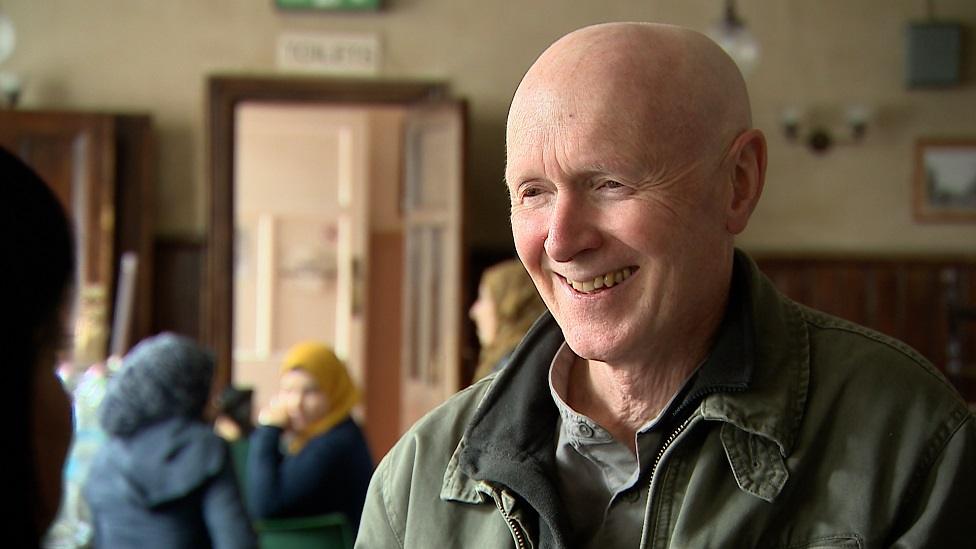Ken Loach inspired by the North East for film The Old Oak
- Published

The director will be 87 when the film is released next year
Acclaimed director Ken Loach has returned to the north-east of England for his latest film. Following I, Daniel Blake and Sorry We Missed You - both set in Newcastle - The Old Oak tells the story of Syrian refugees arriving in a former pit village in County Durham. The BBC had exclusive access to the set.
In Murton, about six miles from Sunderland, a big, black pit wheel stands as a memorial to the village's former colliery.
The coal and the jobs are long gone, but during the summer - just behind the wheel - was a hive of activity as a Ken Loach's film crew set up at the Glebe Community Centre.
Alongside a timetable for slimming groups, mum and toddler classes, yoga and short-mat bowls, the celebrated filmmaker and his team busied themselves with a schedule taking in locations in three former mining communities, including nearby Horden and Easington.
On the day of my visit, activity was centred on a disused pub on Murton's main road.
Formerly The Victoria, it had been transformed into The Old Oak for the six-week shoot.
The pub is at the heart of the film - where the villagers meet - but with the influx of refugees, it becomes contested territory and the community splinters in the midst of the new arrivals.
It is a tale that could be set in any number of communities, but Loach has chosen to return to the North East following his previous films in 2016 (I, Daniel Blake) and 2019 (Sorry We Missed You).
So what has brought him back?
"The North East encapsulates both the gross exploitation, the inequality and the sense of being neglected with a real strength and a history of solidarity and the wit of the people as well," the veteran director said.

A disused pub in Murton was converted into The Old Oak for filming
For award-winning writer Paul Laverty, who has worked alongside Loach for nearly 30 years, producing the screenplay involved studying the community in depth.
"Part of it is doing journalistic work. Part of it is listening to people," he said.
"I went and visited many of these communities and I spoke to the people. People in their nineties who told me stories.
"Some of them remember the Easington colliery disaster in 1951. One wonderful old lady was a nurse that day, when 83 people died.
"I spoke to generations afterwards [from] during the Miners' Strike, what happened after the Miners' Strike, how these communities had been abandoned.
"Now we have a situation where so many of these villages are just forgotten about."

Paul Laverty spent time visiting communities in County Durham
After their previous two "very tough" films, Laverty and Loach felt they had "unfinished business" in the North East.
"We really wanted to look at the notion of hope. Where do we draw nourishment from each other? How do people who are traumatised, hurt and marginalised draw strength from each other?" Laverty said.
"I think that's why it was very important to link this back to what happened during the Miners' Strike.
"We saw then incredible communities coming together with great organisation. I spoke to many of them who looked after each during that very, very difficult year.
"It was important to us to make this film in a real ex-mining community. "

The Hassoun sisters found sanctuary in County Durham in 2016
The Loach approach is famously all about authenticity, often casting novice actors in leading roles. In this case, that means employing real refugees.
Waiting patiently in the corner of the pub are the Hassoun sisters. They fled war-torn Syria and found sanctuary in County Durham six years ago.
Hasna, 46, lost her husband, two young children and both her legs in a shelling in Syria in 2012.
For her, the filming experience has been profound: "I believe everything was destiny and I have faith. Everyone has a story… good or bad.
"I was interested to do this film because I would like to do something in my life. It is a new experience. I like the idea of this film because the director was different.
"The first day was amazing. I felt myself fly like a butterfly. I felt rest in my soul. I felt I had done something good. It's meant everything for me."

The Hassoun sisters said the film's storyline mirrored their own lives
When the sisters arrived, they spoke no English. When they were invited to audition for the film, they had no idea who Loach was. All they knew was that the filmmakers wanted some Syrian families.
"The county council called us and told us about this film and this director and asked if we are interested," said middle sister Sabah, 36.
"We said 'why not? Let's go and do the audition.' We were lucky!".
Youngest sister Rabia, 29, recognised their own story in the script: "How we came here, how we are living here, how we faced some good people and bad people where we live.
"The reaction of the people. How it was when we came. How we improved quickly and integrated into the community. It's a great chance to film this."

Dave Turner said he is amazed at the reactions Ken Loach has coaxed out of him
Dave Turner, a retired County Durham firefighter, plays the lead role of TJ Ballantyne, owner of The Old Oak.
Bar a couple of fleeting appearances in Loach's last two films, he has no acting experience.
Even with filming well under way, he still could not believe he got the part and marvelled at how the director coaxed emotions out of him.
"I genuinely don't have a clue what I am doing," he said.
"It is terrifying, there is no other word to describe it. But because it is Ken Loach and because the people around him make you believe you can do it - that is the reason why I am here.
"We had a day's rehearsal for one of the big scenes before we started filming and I was just standing there thinking, how have I ended up here?
"There is no way in God's green earth I would put myself through this again with anybody other than Ken Loach."

A disused pub has been transformed into The Old Oak, which gives the film its title
The director himself said he wanted to make a film which had some optimism, as well as showing the difficulties of the situation.
"When the pits shut nothing replaced them, communities were destroyed and the people that come from a war, well you can imagine the traumas they've had.
"So the two communities meeting each other and finding a way to survive, if it works should give us some hope."
He will be 87 when The Old Oak is released in 2023, so does the seemingly indefatigable tour de force think the time has come for the credits to roll on his career?
"There are so many stories but there comes a time when you have to accept the inevitable and hang up whatever it is that film directors hang up."
Will this be his last film?
"Who knows, but I can't imagine another at the moment."
He always says that though.

Follow BBC North East & Cumbria on Twitter, external, Facebook, external and Instagram, external. Send your story ideas to northeastandcumbria@bbc.co.uk, external.
- Published11 November 2019

- Published21 October 2016

- Published23 May 2016
